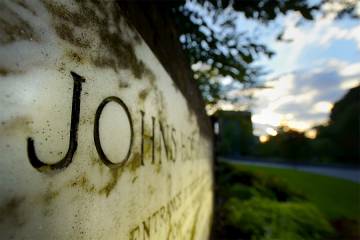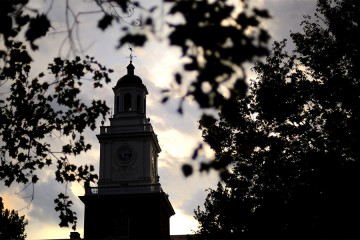Maryland's General Assembly last night approved legislation that would allow Johns Hopkins University to establish its own police department, clearing the way for the bill to become law.
The legislation, a key step in the university's ongoing efforts to improve safety on and around its campuses in Baltimore, authorizes Johns Hopkins to replace its current team of armed, off-duty Baltimore Police Department officers with sworn university police officers. It also includes new funding for initiatives and programs designed to strengthen communities in Baltimore and across the state.
The legislative effort followed months of campus and community conversations about the best ways to respond to an increase in violent crime, both citywide and near JHU's campuses. The bill, the Community Safety and Strengthening Act, engendered both support and opposition as it made its way through the legislative process over the past eight weeks.
"We believe in the end that this legislation reflects an approach to university and community safety that we can be proud of at Johns Hopkins and in Baltimore, setting a standard as the most comprehensive set of university policing requirements anywhere," Johns Hopkins University President Ronald J. Daniels and Johns Hopkins Medicine CEO Paul B. Rothman wrote in a message to the Hopkins community Monday night. "Yet we also know that the true test of this effort lies ahead, as we begin the work of building a constitutional, community-oriented, and publicly accountable university police department, with fidelity to the letter and spirit of this law."
Once the bill is signed into law, it will go into effect on July 1, at which time the university will begin a multiyear planning and implementation period. That will include beginning discussions with the Baltimore Police Department about drafting a memorandum of understanding to outline an operational framework for the university's police department and initial engagement with the community around the MOU and the establishment of the first police accountability board. Both processes will include opportunities for direct community engagement and feedback.
The university will also develop plans for the phased recruiting and training of new officers in accordance with the standards specified by the legislation. The department will reflect the university's commitment to best practices in constitutional and community-oriented policing, uphold the university's values of inclusion and respect, and be subject to greater public accountability than any other Maryland law enforcement agency.
When fully staffed, the department will include no more than 100 employees, including fully sworn officers who will be trained and certified to carry firearms in the course of their duties, as are officers at the other university police departments in Baltimore. The officers will receive additional training on de-escalation techniques, crisis response, and racial profiling prevention, among other critical skills. The majority of the security personnel at the university—about 1,000 people—will remain unarmed.
"We take seriously the responsibility now vested in us by the state, and entrusted to us by our neighbors and community leaders, to create a university police department that makes real the ideals and best practices of 21st century policing," wrote Daniels and Rothman, who also thanked the bill's supporters and opponents for their "participation in critical conversations around policing, crime, community, race, and the appropriate role of a university in contributing to public safety.
"These are complex issues," they added, "touching on deeply held beliefs and experiences, and we have been appropriately challenged to listen closely to the concerns of all those we are here to serve. At your urging, we have sought to bring to bear best practices, expertise, and research as we worked to develop a sound set of strategies for approaching the challenge before us."
For more information, visit the university's Public Safety website
Posted in University News
Tagged campus safety and security









